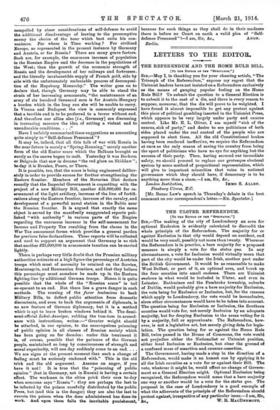THE ULSTER REFERENDUM.
[To ens Bono. op Pam "SpropaToo."1 SIR,—The making of the city of Londonderry an area for optional Exclusion is evidently calculated to discredit the whole principle of the Referendum. The majority for or against Exclusion in that city would depend on accident, and would be very small, possibly not more than twenty. Wherever the Referendum is in practice, a bare majority for a proposed measure is simply a vote for the status quo. In any circumstances, a vote for Inclusion would virtually mean that part of the city would be under the Irish, another part under the British Government. It would be as reasonable to make West Belfast, or part of it, an optional area, and break up the four counties into small enclaves. There are Unionist enclaves in what would be included in Ulster, and even in Leinster. Rathmines and the Pembroke township, suburbs of Dublin, would probably give a bare majority for Exclusion, the vote being for Exclusion or Inclusion, but, for the reasons which apply to Londonderry, the vote would be inconclusive, since other circumstances would have to be taken into account. The question being for Exclusion or Inclusion, the Southern counties would vote for, not merely Inclusion by an adequate majority, but for denying Exclusion to the areas voting for it by a majority, full or approximate. The Referendum, how- ever, is not a legislative act, but merely giving data for legis- lation. The question being for or against the Home Rule Bill, twice passed in the House of Commons, the vote would not prejudice either the Nationalist or Unionist position, either local Inclusion or Exclusion, but clear the ground of a confused mass of assertion and counter-assertion.
The Government, having made a step in the direction of a Referendum, would make it an honed one by applying it to all the Irish counties as a vote for or against their Bill. The vote, whatever it might be, would effect no change of Govern- ment as a General Election might. Optional Exclusion being recognized, the Referendum would mean that a bare majority one way or another would be a vote for the status quo. The proposal in the came of Londonderry is a good example of what the adherents of the principle of the Referendum should protest against, irrespective of any particular issue.—I am, Sir,










































 Previous page
Previous page